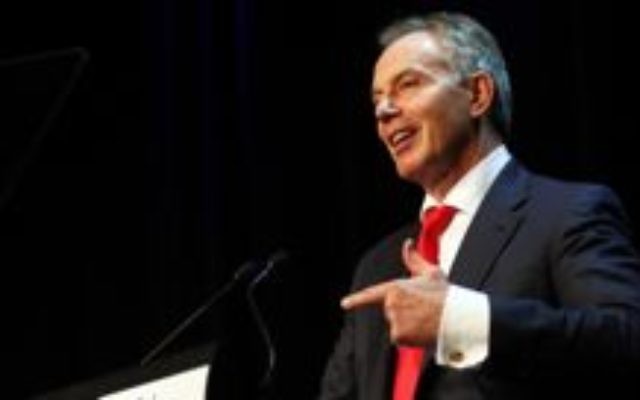The Blair peace project
THE role of a mediator is not to merely go between two parties but to lead them to a position where they want peace, Middle East Quartet representative and former British prime minister Tony Blair told an audience in Sydney last Friday.
THE role of a mediator is not to merely go between two parties but to lead them to a position where they want peace, Middle East Quartet representative and former British prime minister Tony Blair told an audience in Sydney last Friday.
Blair addressed the Sydney lunch two days after speaking to a similar gathering in Melbourne.
Among the many points raised, Blair said there were similarities between the successful Northern Ireland peace process, in which he participated, and trying to solve the Israeli-Palestinian conflict.
“First of all, you never give up,” he said. “Secondly you can never make peace unless you build trust.”
He said unionists would tell him they appreciated his efforts in trying to broker peace, but the republicans weren’t interested. The republicans then said a similar thing about the unionists. “And the problem is, both were wrong,” he said.
“The role of the mediator or peacemaker is not to go between them but to lead them to a position where they actually understand that in the right circumstances they do both want peace. You just never give up on it and that’s what we’ve got to do with the Israeli-Palestinian conflict.”
Blair said there would be peace in our time, but warned of “real challenges” in the short term.
“The only way you’re going to make peace is by building from the bottom up as well as negotiating from the top down,” he said.
“I believe that is possible, I think there is no alternative but two states for two people.
“I honestly don’t believe there is anything more important for the future and security of the region than peace, a lasting peace with Israel secure, recognised by its neighbours and its right to exist accepted universally, and a viable and independent Palestinian state.”
He said the emergence of the Arab Spring made the need for a settlement even more urgent, arguing that not only had the fall of Egyptian president Hosni Mubarak affected the Palestinian Authority as it had Israel, but also that Hamas’s relationship with Bashar al-Assad in Syria had been disrupted by the instability there.
“Some people say that as a result of all these changes it’s gong to be harder to make peace now,” he said. “My view is exactly the opposite. As a result of these changes it’s all the more imperative to make peace.”
Gareth Narunsky


comments